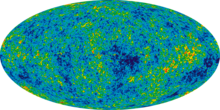| Part of a series on |
| Physical cosmology |
|---|
 |

In cosmology, the steady-state model or steady state theory is an alternative to the Big Bang theory. In the steady-state model, the density of matter in the expanding universe remains unchanged due to a continuous creation of matter, thus adhering to the perfect cosmological principle, a principle that says that the observable universe is always the same at any time and any place.
From the 1940s to the 1960s, the astrophysical community was divided between supporters of the Big Bang theory and supporters of the steady-state theory. The steady-state model is now rejected by most cosmologists, astrophysicists, and astronomers.[1] The observational evidence points to a hot Big Bang cosmology with a finite age of the universe, which the steady-state model does not predict.[2]
- ^ Kragh, Helge (1999). Cosmology and Controversy: The Historical Development of Two Theories of the Universe. Princeton University Press. ISBN 978-0-691-02623-7.
- ^ "Steady State theory". BBC. Retrieved January 11, 2015.
[T]he Steady State theorists' ideas are largely discredited today...